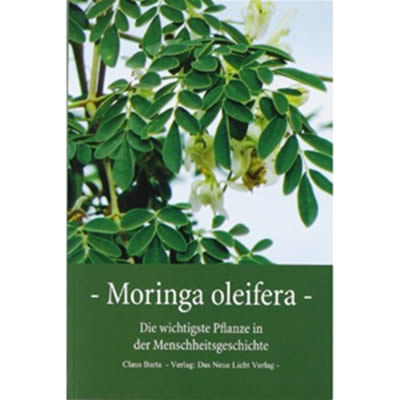The Moringa tree (Moringa Oleifera), is the only genus in the family Moringaceae. This plant also known as “Drumstick Tree“, is a tree which essentially grew in the Himalayan region of northern India, however is now cultivated in the Pacific and Caribbean Islands, Africa, Malaysia, Pakistan, Central and South America. Different parts of this plant such as the leaves, seed, bark, roots, flowers, fruit, and immature pods act as heart and circulatory stimulants, possess antitumor, antioxidant, antidiabetic, anti inflammatory, hepatoprotective, antihypertensive, antispasmodic, antifungal and antibacterial effects, and are being employed for the therapy of various diseases. Traditional Ayurvedic Medicine (India’s ancient tradition) has reported on 300 ailments that can be treated with moringa leaf. Because of the positive effects of Moringa, the World health Organization and European Union now plant and support its cultivation in different locations, including Africa, in order to combat malnutrition. Moringa oleifera is considered a super-food because it contains many nutrients.
Substances Contained in The Plant; Vitamin A, Vitamin C, Vitamin E, Vitamin K, Thiamin, Riboflavin, Niacin, Vitamin B6, Alpha-Carotene, Beta-Carotene, Calcium, Potassium, Zinc, Magnesium, Selenium, Copper, Chlorophyll, Alanine, Arginine, Histidine, Methionine, Tryptophan, Cystine, Tyrosine, Leucine, Isoleucine, Sulfur, Beta-sitosterol, Glutathione, Caffeoylquinic Acid, Campesterol, Kaempferal, Chromium, Delta-5-Avenasterol, Delta-7-Avenasterol, Indole Acetic Acid, Indoleacetonitrile, Kaempferal, Leucine, Stigmasterol, Phenylalanine, Quercetin, Rutin, Lutein, Zeaxanthin, Myristic-Acid, Palmitic-Acid, Prolamine, Proline, Threonine, Xanthins, Xanthophyll, Zeatin, Omega 3, Omega 6, Omega 9, Oleic-Acid and Fiber.
Moringa Benefits
 Moringa is an angiosperm plant, native of the Indian subcontinent, where its various parts have been utilized for centuries as food and medicine. The leaves, seeds, bark, root, fruit, and flowers are used to make drug. Lab experiments and animal-based studies indicate that the leaf, root, and seed extracts of Moringa oleifera have hypoglycemic, anti-inflammatory, hepatoprotective, anticancer, antiviral, antibacterial, and antifungal activity. Various researches show to the elevation of a variety of detoxication and antioxidant enzymes and biomarkers as a sequel of therapy with phytochemicals isolated from Moringa.
Moringa is an angiosperm plant, native of the Indian subcontinent, where its various parts have been utilized for centuries as food and medicine. The leaves, seeds, bark, root, fruit, and flowers are used to make drug. Lab experiments and animal-based studies indicate that the leaf, root, and seed extracts of Moringa oleifera have hypoglycemic, anti-inflammatory, hepatoprotective, anticancer, antiviral, antibacterial, and antifungal activity. Various researches show to the elevation of a variety of detoxication and antioxidant enzymes and biomarkers as a sequel of therapy with phytochemicals isolated from Moringa.
High oleic acid content, moringa oleifera oil penetrates deeply into the skin, delivering valuable nutrients and helping the skin and hair retain moisture. Also moringa oil, is a preferred oil for the products of cosmetics as it has numerous antioxidants and documented skin-rejuvenating effects.
There is potential for water- and alcohol-based leaf tinctures to fight a diverse of bacterial infections, according to a 2011 study reported in the “Asian Pacific Journal of Tropical Medicine“. In another study, found that moringa extracts killed, Staphylococcus aureus, Pseudomonas aeruginosa, Escherichia coli and Enterobacter aerogenes bacteria. COX-2 enzyme is responsible for inflammation processes and pain. Moringa Oleifera suppresses the COX-2 enzyme (cyclooxygenase-2), which causes inflammation and the pain related to it.
The antiatherosclerotic, hypolipidemic and antioxidant effects are thought to help avoid cardiovascular ailments. In a study reported in the March 2008 issue of the Journal of Ethnopharmacology has found that the leaf extracts of moringa avoid the formation of plaques in the blood vessels. Compounds found in moringa oleifera leaves such carbamate, thiocarbamate, or nitrile, are acetylated glycosides. It’s these compounds that contribute to a lowering activity in blood pressure. A study reported in “Phytotherapy Research” in 2006 showed that moringa leaf extract had a noteworthy activity in reducing blood pressure levels. The leaves are considered to have a stabilizing activity on control glucose levels. According to a study reported in the May 2007 edition of the Journal of Clinical Biochemistry and Nutrition, moringa leaf may help administer glucose intolerance in diabetes people.
New researches examined specific compounds for cancer prophylactic probability. The related compound were shown to be strong inhibitors of phorbol ester-induced Epstein-Barr virus early antigen activation in lymphoblastoid cells. Moringa indicates anti-cancer activities via apoptosis in ovarian cancer cells and by inhibiting NF-kappaB. A study was investigated to identify the antiproliferative and apoptotic events of Moringa leaf extract using human tumor cell line. Human tumor cells were cultured in the presence of Moringa oleifera leaf extract at different concentrations for 48 hours and the percentage of cell viability was analyzed by MTT assay. Moringa oleifera leaf extract demonstrated a dose-dependent inhibition of cell proliferation of human tumor cells.
Moringa Dosage
Typical recommended dose dose is 400 mg a day.
Side Effects
Moringa oleifera may interact with prescription medicines. (Inhibits CYP450 enzymes). Moringa extracts have antifertility effects. This plant should not be taken by women during their childbearing years. Also, moringa oleifera root bark can cause violent uterine contractions.
Leave a Reply